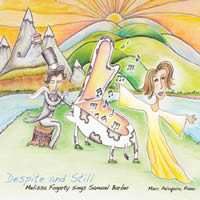Spun of Celestial Shimmers
|
Miri Jassy [January 2012.]
“Despite and Still.” Samuel BARBER: Nuvoletta, Op. 25 (1947); Hermit Songs, Op. 29 (1952-53); “The Secrets of the Old,” Op. 13 No. 2 (1938); “Sure on this Shining Night,” Op. 13 No. 3 (1938); Despite and Still, Op. 41 (1968-69); “Monks and Raisins,” Op. 18 No. 2 (1943); “Rain Has Fallen,” Op. 10 No. 1 (1936); Three Songs, Op. 45 (1972). Melissa Fogarty (S), Marc Peloquin (pno). Aureole Records 101. Distributed in the US by CD Baby (http://www.cdbaby.com/). Memorably dressed in bow tie and tailored suits, you couldn’t picture anyone less hermit-esque than James Joyce. Thriving on company and the lights of Paris, Joyce’s cosmopolitan existence seems far from an ascetic, spiritual solitude, yet both are brought together on Melissa Fogarty’s album, Despite and Still. Released in 2011, Despite and Still is named for a song cycle in Samuel Barber’s plentiful range of vocal chamber music, much of it inspired by the work of early 20th century authors. Together with pianist Marc Peloquin, Melissa Fogarty has created a dynamic introduction to Barber’s world. The drama of the title track is a highlight of the album. Despite and Still, based on the Robert Graves poem, evokes the tumult of the author’s private life. Well respected as a war poet alongside Owen and Sassoon, Graves’ personal life had its share of ecstatic love and torment which is audible in Fogarty’s powerful delivery. A highlight for any “Joycean” — or those with any curiosity about the self-exiled Irishman who wrote Ulysses and Finnegans Wake — is Fogarty’s stunning rendition of Nuvoletta. Barber’s adaptation of this vignette from Finnegans Wake perfectly captures the celestial beauty of Joyce’s nymph of the clouds, and it’s rendered truly superb on this album. Melissa Fogarty’s delightful voice scales the heights of Barber’s composition with energy and delicacy. The Hermit Songs follow. A suite rich in religious settings and imagery, its lyrics are rooted in Celtic literature. This switch to explicitly Christian themes is something of a culture shock for those moved by the thrilling version of Nuvoletta, but Fogarty gives these brief pieces a rich sonority that belies their ascetic aspirations. Surely Joyce would approve of track five, a “Heavenly Banquet” in which the narrator wishes: “I would like them to be cheerful in their drinking.” Fogarty beautifully interprets the range of emotion in these songs, from the playfulness of “A Monk and his Cat” to the spiritual yearning of “The Desire of Hermitage.” Peloquin’s piano responds wonderfully to the demands of each song, particularly the more wistful and dark turns Barber takes, for the songs “In the Wilderness” and “Solitary Hotel.” The latter gives listeners another opportunity to sample Barber’s adaptation of Joyce, focusing this time on a brief excerpt from Ulysses. It’s not widely known that Leopold Bloom’s father committed suicide, a fact which clouds the general cheerfulness of the hero of Ulysses. Stephen and Bloom both imagine a “solitary hotel,” and Fogarty successfully infuses this song with the mix of loneliness and thoughtfulness inspired by Barber’s composition. Joyce’s juvenile “moody brooding” is captured in Barber’s setting of “Rain Has Fallen” from the author’s sole poetry collection, Chamber Music. The modern complexity of the work is sensitively rendered by Fogarty, whose final impassioned lyric (“speak to your heart”) contrasts delicately with the song’s dramatic rise and fall. Fogarty and Peloquin’s intelligent interpretations of Barber’s work make for enjoyable listening. In Despite and Still, you can sense the musicians’ urge to create something definitive, a profound and worthy record of a musical selection that both soloist and accompanist are clearly devoted to. For literary devotees, Barber is a great cultural crossover where music weaves poetry and literature — particularly early to mid-20th century modern works — into a joyous tapestry, spun from the “shimmers” of Joyce’s Nuvoletta. For those inspired by the far-reaching imaginings of Celtic culture in poetry and theology, Barber’s Hermit Songs are a whimsical blend of sacredness and earthy passion. Melissa Fogarty’s voice is evocative throughout, encapsulating the album’s spectrum of human experience from the heavenly to the heartbroken.
[More Miri Jassy]
[More
Barber]
[Previous Article:
Of Pain and Pleasure]
[Next Article:
Mostly Symphonies 19.]
|
